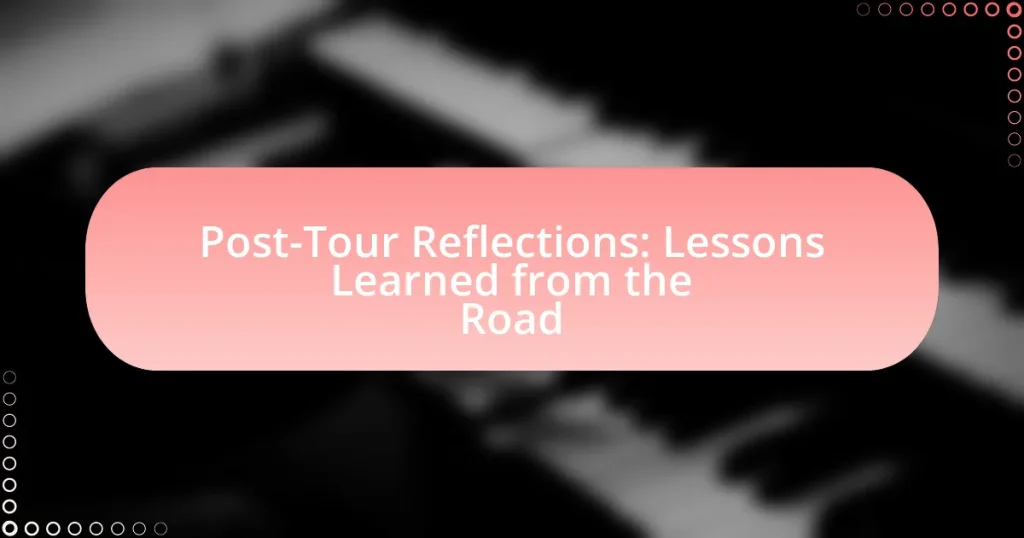Post-Tour Reflections are evaluations and insights gained after completing a journey, encompassing personal experiences, lessons learned, and observations about the places visited. These reflections are crucial for travelers as they promote personal growth, enhance cultural understanding, and improve future travel planning. The article explores the significance of reflecting on travel experiences, common themes that emerge, and methods for documenting these reflections, such as journaling and digital tools. It also discusses how challenges faced during travel can foster resilience and adaptability, ultimately leading to deeper insights and informed future travel decisions.

What are Post-Tour Reflections?
Post-Tour Reflections are evaluations and insights gained after completing a journey or tour. These reflections often encompass personal experiences, lessons learned, and observations about the places visited, interactions with locals, and the overall impact of the journey on the traveler. They serve as a means to process the experiences and can lead to personal growth, enhanced cultural understanding, and improved future travel planning.
Why are Post-Tour Reflections important for travelers?
Post-tour reflections are important for travelers because they facilitate personal growth and enhance future travel experiences. By reflecting on their journeys, travelers can identify what they enjoyed, what challenges they faced, and how those experiences shaped their perspectives. Research indicates that reflection can lead to improved decision-making and increased satisfaction in future endeavors, as it allows individuals to learn from past experiences and apply those lessons effectively. For instance, a study published in the Journal of Travel Research found that travelers who engage in reflective practices report higher levels of travel satisfaction and a greater sense of connection to the places they visited.
How can reflecting on experiences enhance personal growth?
Reflecting on experiences enhances personal growth by allowing individuals to analyze their actions, thoughts, and emotions, leading to deeper self-awareness and understanding. This process encourages critical thinking, enabling individuals to identify patterns in their behavior and learn from both successes and failures. Research indicates that reflective practices, such as journaling or meditation, can significantly improve emotional intelligence and decision-making skills, which are crucial for personal development. For instance, a study published in the Journal of Educational Psychology found that students who engaged in reflective writing showed greater academic performance and self-regulation compared to those who did not. Thus, reflecting on experiences serves as a vital tool for fostering personal growth through enhanced self-awareness and improved cognitive skills.
What insights can be gained from reflecting on travel experiences?
Reflecting on travel experiences can yield insights into personal growth, cultural understanding, and adaptability. Personal growth is often evident as travelers confront challenges and step outside their comfort zones, leading to increased self-confidence and resilience. Cultural understanding deepens as individuals engage with diverse communities, fostering empathy and broadening perspectives on global issues. Adaptability is enhanced through navigating unfamiliar environments, which cultivates problem-solving skills and flexibility. These insights are supported by studies indicating that travel can significantly impact emotional well-being and cognitive flexibility, as noted in research published in the Journal of Travel Research, which highlights the psychological benefits of immersive travel experiences.
What common themes emerge in Post-Tour Reflections?
Common themes that emerge in Post-Tour Reflections include personal growth, cultural appreciation, and the importance of connection. Personal growth is often highlighted as individuals reflect on their experiences, noting how challenges faced during the tour foster resilience and adaptability. Cultural appreciation is evident as travelers express newfound respect for diverse customs and traditions encountered along the journey. The importance of connection is emphasized through shared experiences with fellow travelers and locals, which often leads to lasting friendships and a deeper understanding of global perspectives. These themes are consistently reported in various travel blogs and journals, reinforcing their significance in the post-tour reflection process.
How do cultural experiences shape reflections?
Cultural experiences shape reflections by influencing individuals’ perceptions, values, and understanding of the world. Engaging with diverse cultures exposes individuals to new ideas, practices, and social norms, which can lead to a reevaluation of their own beliefs and behaviors. For instance, studies show that travel and cultural immersion can enhance empathy and open-mindedness, as individuals confront different lifestyles and viewpoints. Research conducted by the University of California found that participants who engaged in cultural exchanges reported significant shifts in their perspectives, highlighting the transformative power of cultural experiences on personal reflection.
What role do challenges play in shaping travel reflections?
Challenges play a crucial role in shaping travel reflections by prompting deeper self-examination and personal growth. When travelers encounter obstacles, such as language barriers or unexpected changes in plans, they are often forced to adapt and reassess their perspectives. This process of overcoming difficulties can lead to valuable insights about resilience, cultural understanding, and the importance of flexibility. Research indicates that experiences of adversity during travel can enhance emotional intelligence and foster a greater appreciation for diverse cultures, as travelers reflect on how challenges have influenced their journey and personal development.

How can travelers effectively document their Post-Tour Reflections?
Travelers can effectively document their Post-Tour Reflections by maintaining a structured journal that captures their experiences, thoughts, and lessons learned during the trip. This method allows travelers to organize their reflections chronologically or thematically, making it easier to revisit and analyze their insights later. Research indicates that journaling enhances memory retention and emotional processing, which supports the idea that writing down experiences can lead to deeper understanding and personal growth. Additionally, incorporating photographs and mementos into the journal can provide visual context and enrich the narrative, further solidifying the memories associated with the trip.
What methods can be used to capture reflections during travel?
Methods to capture reflections during travel include journaling, photography, audio recording, and blogging. Journaling allows travelers to document their thoughts and experiences in real-time, fostering deeper personal insights. Photography captures visual memories and can evoke emotional responses when revisited. Audio recording provides an alternative way to express thoughts verbally, preserving the spontaneity of reflections. Blogging enables sharing experiences with a wider audience, encouraging interaction and feedback. These methods are effective as they cater to different preferences and can enhance the overall travel experience by promoting mindfulness and self-reflection.
How does journaling contribute to deeper reflections?
Journaling contributes to deeper reflections by providing a structured space for individuals to articulate their thoughts and emotions. This practice encourages self-exploration and critical thinking, allowing individuals to analyze their experiences more thoroughly. Research indicates that writing about personal experiences can enhance emotional processing and lead to greater self-awareness, as evidenced by a study published in the Journal of Clinical Psychology, which found that expressive writing significantly improves psychological well-being. By regularly engaging in journaling, individuals can identify patterns in their thoughts and behaviors, facilitating a deeper understanding of their personal journeys and lessons learned.
What digital tools can assist in documenting travel experiences?
Digital tools that can assist in documenting travel experiences include mobile applications, digital cameras, and cloud storage services. Mobile applications like TripIt and Google Maps allow travelers to organize itineraries and share experiences in real-time. Digital cameras and smartphones enable high-quality photo and video capture, preserving memories visually. Cloud storage services such as Google Drive and Dropbox facilitate easy access and sharing of travel documents and media, ensuring that experiences are well-documented and easily retrievable. These tools enhance the ability to capture, organize, and share travel experiences effectively.
How can travelers analyze their reflections for future journeys?
Travelers can analyze their reflections for future journeys by systematically reviewing their experiences, identifying key lessons, and documenting insights. This process involves reflecting on aspects such as destinations visited, activities enjoyed, and challenges faced, which can be recorded in a travel journal or digital format. Research indicates that reflective practices enhance learning and retention; for instance, a study published in the Journal of Experiential Education found that structured reflection significantly improves the ability to apply past experiences to future situations. By categorizing reflections into themes like cultural interactions, logistical planning, and personal growth, travelers can create actionable strategies for enhancing future travel experiences.
What questions should travelers ask themselves during analysis?
Travelers should ask themselves questions such as: What were my expectations before the trip, and how did they compare to my actual experiences? This question helps in evaluating the alignment between anticipation and reality, which is crucial for personal growth. Additionally, travelers should consider what challenges they faced and how they overcame them, as this reflection can enhance problem-solving skills. Another important question is: What cultural insights did I gain, and how can they influence my perspective moving forward? This inquiry fosters a deeper understanding of diverse cultures and promotes empathy. Lastly, travelers should reflect on what they would do differently in future travels, which aids in planning and improving future experiences. These questions collectively contribute to a comprehensive analysis of the travel experience, facilitating learning and development.
How can reflections inform future travel planning?
Reflections can inform future travel planning by providing insights into past experiences that highlight preferences, challenges, and successes. Analyzing what worked well or what did not during previous trips allows travelers to make more informed decisions regarding destinations, accommodations, and activities. For instance, a traveler may realize they prefer cultural experiences over relaxation after reflecting on their past trips, leading them to prioritize museums and local events in future itineraries. This process of reflection can also reveal logistical issues, such as transportation difficulties or timing conflicts, enabling travelers to avoid similar pitfalls in future plans.

What lessons can be learned from Post-Tour Reflections?
Post-Tour Reflections reveal critical lessons about personal growth, cultural understanding, and logistical planning. These reflections often highlight the importance of adaptability in unfamiliar environments, as travelers encounter unexpected challenges that require quick thinking and flexibility. Additionally, they emphasize the value of engaging with local cultures, which fosters empathy and broadens perspectives. Logistically, reflections can underscore the necessity of thorough preparation and the ability to learn from mistakes made during the journey, ultimately leading to improved future travel experiences.
How do reflections influence personal values and priorities?
Reflections significantly influence personal values and priorities by enabling individuals to assess their experiences and derive meaning from them. Through the process of reflection, people can identify what truly matters to them, often leading to a re-evaluation of their goals and beliefs. For instance, studies show that engaging in reflective practices, such as journaling or meditation, can enhance self-awareness and clarify one’s values, which in turn helps prioritize actions aligned with those values. This alignment often results in more fulfilling life choices and a stronger sense of purpose.
What specific lessons can be drawn from cultural interactions?
Cultural interactions teach the importance of empathy and understanding in diverse societies. Engaging with different cultures fosters appreciation for varying perspectives, which can lead to enhanced communication and collaboration. For instance, studies show that individuals who participate in cultural exchanges report increased openness to new ideas and a greater ability to navigate multicultural environments. This is supported by research from the Journal of Cross-Cultural Psychology, which indicates that exposure to diverse cultures improves social skills and reduces prejudice.
How can overcoming travel challenges lead to resilience?
Overcoming travel challenges fosters resilience by enhancing problem-solving skills and adaptability. When travelers face obstacles such as missed flights, language barriers, or cultural misunderstandings, they are compelled to think critically and devise solutions on the spot. This process not only builds confidence but also reinforces the ability to cope with future difficulties. Research indicates that individuals who navigate challenging situations often develop a stronger sense of self-efficacy, which is crucial for resilience. For instance, a study published in the Journal of Personality and Social Psychology found that overcoming adversity contributes to psychological growth and resilience, demonstrating that the skills gained during travel challenges can be applied to various life situations.
What practical tips can enhance the reflection process?
To enhance the reflection process, individuals should engage in structured journaling, which allows for organized thoughts and insights. Structured journaling involves setting aside dedicated time to write about experiences, feelings, and lessons learned, promoting deeper understanding and retention of information. Research indicates that reflective journaling can improve critical thinking skills and self-awareness, as evidenced by a study published in the Journal of Educational Psychology, which found that students who engaged in reflective writing showed significant gains in their ability to analyze and synthesize information. Additionally, incorporating prompts or questions can guide reflections, making them more focused and productive.
How can setting aside time for reflection improve the experience?
Setting aside time for reflection can significantly enhance the experience by allowing individuals to process their thoughts and emotions related to the events they encountered. This practice fosters deeper understanding and retention of lessons learned, as studies indicate that reflection can improve memory consolidation and critical thinking skills. For instance, research published in the journal “Educational Psychology” demonstrates that reflective practices can lead to better learning outcomes, as individuals who engage in reflection are more likely to integrate new information with prior knowledge. Thus, dedicating time for reflection not only enriches personal insights but also contributes to overall experiential growth.
What are the benefits of sharing reflections with others?
Sharing reflections with others enhances understanding and promotes personal growth. When individuals articulate their thoughts and experiences, they gain new perspectives that can lead to deeper insights. Research indicates that discussing reflections can improve critical thinking skills and foster emotional intelligence, as it encourages individuals to process their experiences collaboratively. For instance, a study published in the Journal of Educational Psychology found that peer discussions significantly enhance learning outcomes by allowing participants to challenge and refine their ideas. Thus, sharing reflections not only solidifies personal learning but also builds community and support among individuals.


